A Quote by Leigh Bardugo
Let go of the idea that somehow you can outsmart a first draft. Because I have never met anybody who can.
Related Quotes
I am a technophile, so there is no such thing as a first draft. The first draft plunges on, and about a quarter of the way through it I realise I'm doing things wrong, so I start rewriting it. What you call the first draft becomes rather like a caterpillar; it is progressing fairly slowly, but there is movement up and down its whole length, the whole story is being changed. I call this draft zero, telling myself how the story is supposed to go.
Writing the first draft of a new story is incredibly difficult for me. I will happily do revisions, because once I can see the words on the page, I can go about ripping them up and moving scenes around. A blank page, though? Terrifying. I'm always angsty when I'm working my way through a first draft.
The Republicans didn't get rolled by anybody. Chuck Schumer didn't outsmart Mitch McConnell, and Nancy Pelosi sure as hell did not outsmart Paul Ryan. I don't care what you think of Ryan, he's not an idiot, folks. These people are not dumb. They're not sitting up there thinking, "All we gotta do is be nice to the Democrats and the media."
Almost all good writing begins with terrible first efforts. You need to start somewhere. Start by getting something-anything-down on paper. A friend of mine says that the first draft is the down draft-you just get it down. The second draft is the up draft-you fix it up. You try to say what you have to say more accurately. And the third draft is the dental draft, where you check every tooth, to see if it's loose or cramped or decayed, or even, God help us, healthy.
































